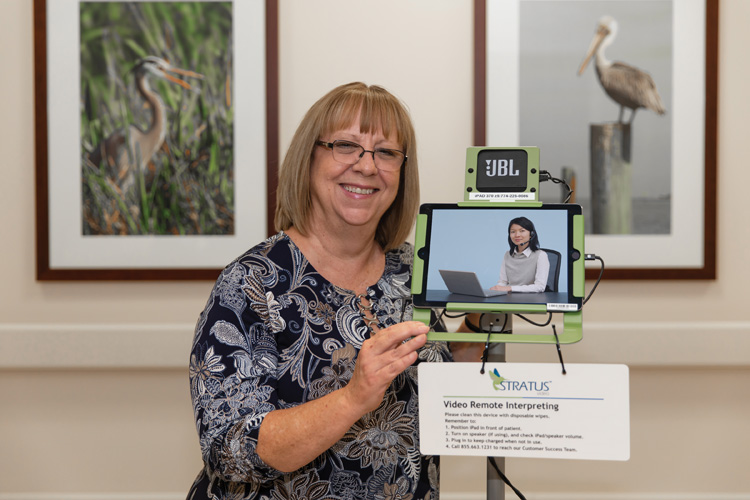
Imagine. You’re in a foreign country. You suffer a medical emergency. Even assuming you can find your way to the nearest hospital, it’s possible no one there will speak English fluently enough for you to explain what’s wrong.
It happens. Overseas and here in Florida, too.
In fact, Visit Florida, the state’s official source for travel planning, marketing and tourism, says some 10.7 million overseas visitors come to the Sunshine State each year. Inevitably, some of them fall ill or suffer accidents while they are here and need medical care.
That’s one reason state and federal authorities, including the Centers for Medicare and Medicaid Service (CMS), have mandated that Florida hospitals have certified medical translators available. But keeping medical-grade translators for dozens of languages on hand isn’t easy – and there isn’t a pill that will solve the problem.
But there is a tablet.
Specifically, there’s the iPad. And the Steward Medical Group’s Sebastian River Medical Center has just added 13 of them, mounted on poles with wheels that allow them to be taken anywhere in the hospital so that patients whose first language isn’t English can explain – in their native tongue and in real time – what their symptoms are to someone who not only is fluent in that language but also is a certified medical translator.
The service, called “video remote interpretation,” comes from a company called Stratus Video of Clearwater, Florida, which currently provides onscreen translations for 27 different languages.
Stratus Video is the largest video remote interpreting company in the world, with more than 1,500 hospitals and thousands of clinics using its service, which is available for emergency situations, complex diagnosis descriptions, psychological assessments and even regularly scheduled doctor’s appointments.
SRMC’s education director Amy Colletti says the hospital’s registration desk is “a big area that needs” the translation service, and points out it’s also used in the diagnostic center, emergency department and elsewhere.
The idea is not an entirely new one. Translation services have been available by telephone for years, but the addition of real-time video, in Colletti’s eyes, is a game-changer.
“To have someone face-to-face like that on video conferencing is a lot better than on the phone. I think it’s a more personal service,” she says, because “there’s a lot of communication that’s not verbal. This captures communication through body language, tone of voice and facial expressions.”
Nurse leader Janice Meadows agrees. In just a short time “it’s been very successful,” she says.
“We’ve had them about three weeks and have had the opportunity to use it in a couple different settings,” Meadows explains. “I have the orthopedic service line here and we had a gentleman who was Spanish-speaking who needed an interpreter so we could tell whether he understood everything” he was being told.
Equally to the point, Meadows continues, “his wife and family were so appreciative” because they were able to more fully understand the situation.
Sebastian River Medical Center, a 154-bed hospital at 13695 U.S. 1 near the Indian River County/Brevard County line, is part of the Steward Medical Group. The main number at the hospital is 772-589-3186.



